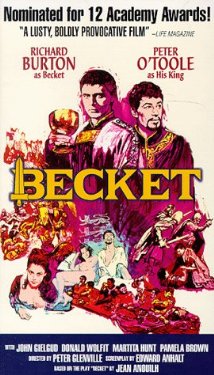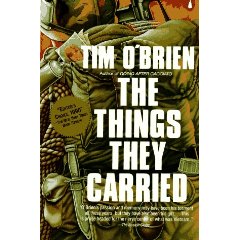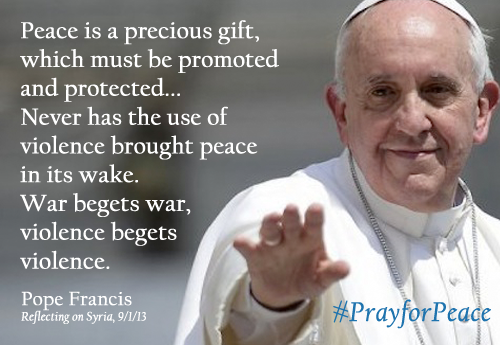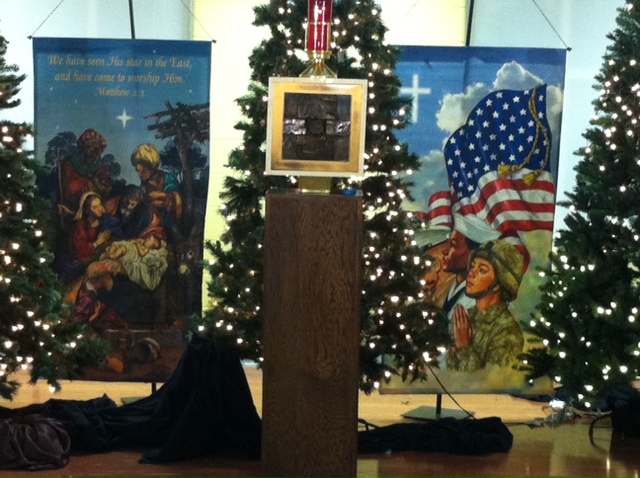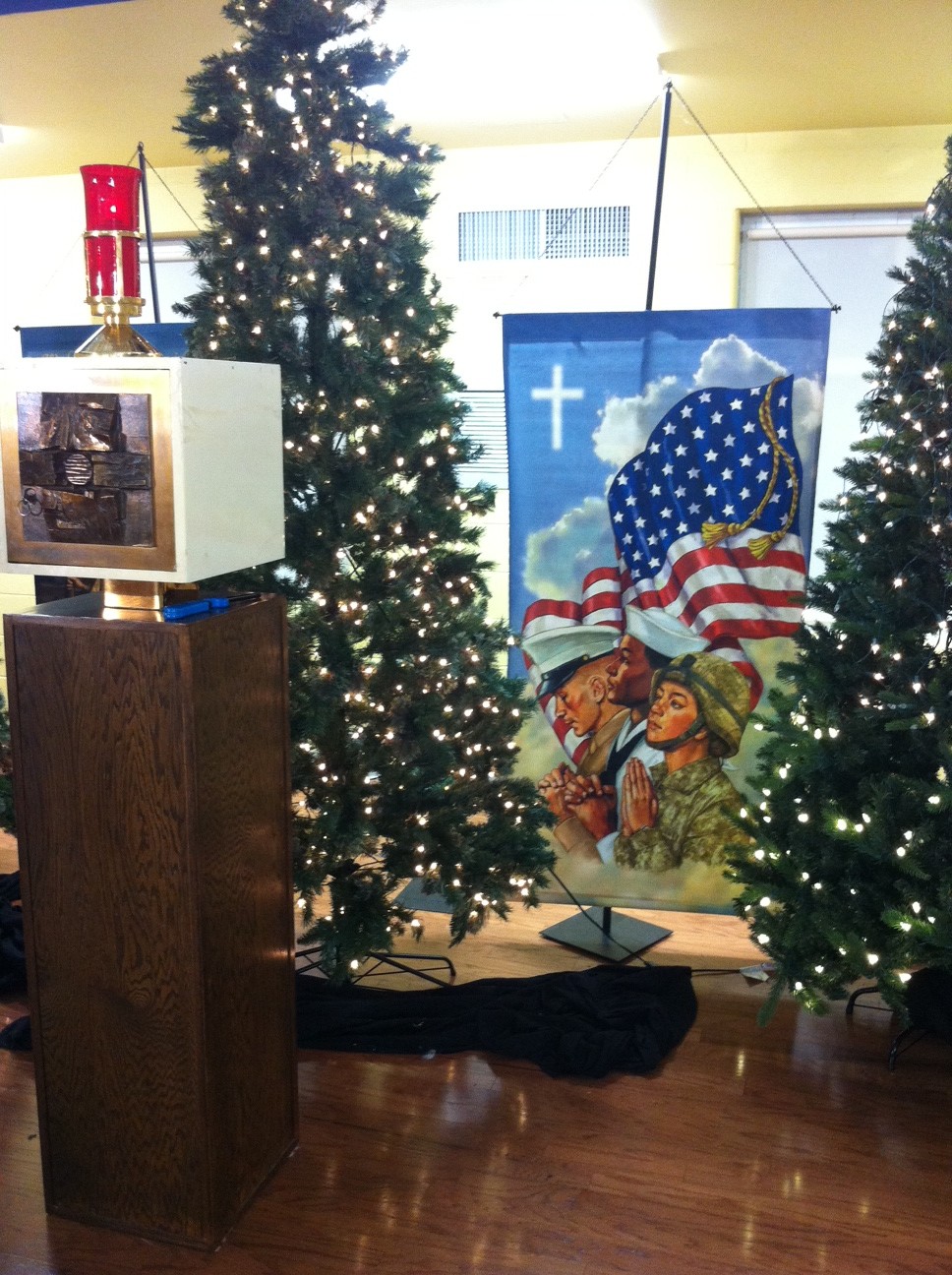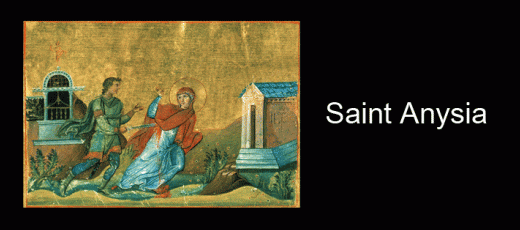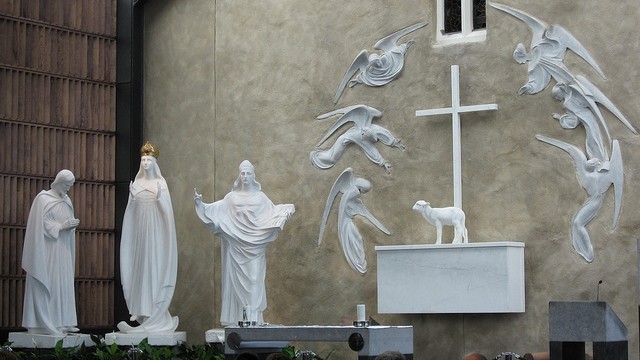This blog, this site, are not libertarian. One does not have to be a libertarian to oppose militarism. However, libertarians’ appreciation of the State as that which has a monopoly on the use of force (violence) leads them to be extremely wary of the dangers posed when too much power is 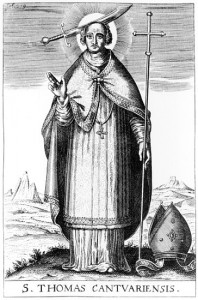 placed, unopposed and unrestrained, in the hands of the State. Thus, Saint Thomas Becket is often mentioned in discussions of libertarianism and Catholicism, because as the Archbishop of Canterbury, he died defending the ancient rights of the Church against an aggressive state.
placed, unopposed and unrestrained, in the hands of the State. Thus, Saint Thomas Becket is often mentioned in discussions of libertarianism and Catholicism, because as the Archbishop of Canterbury, he died defending the ancient rights of the Church against an aggressive state.
Becket was martyred on Dec. 29, 1170. Within four years he had been made a saint. A contemporary monk said that after being named archbishop by King Henry II, “Thomas Becket put off the secular man and put on Jesus Christ.” His feast day is December 29.
From Libertarianism: A Primer:
“The independence of the Western Church, which came to be known as Roman Catholic, meant that throughout Europe there were two powerful institutions contending for power. Neither State nor Church particularly liked the situation, but their divided power gave breathing space for individuals and civil society to develop. Popes and emperors frequently denounced each other’s character, contributing to a delegitimization of both. Again, this conflict between Church and State was virtually unique in the world, explaining why the principles of freedom were discovered first in the West.
In the 4th century the emperor Theodosius ordered the bishop of Milan, St. Ambrose, to hand over his cathedral to the empire. Ambrose rebuked the emperor, saying, ‘It is not lawful for us to deliver it up nor for your majesty to receive it. By no law can you violate the house of a private man. Do you think that the house of God may be taken away? It is asserted that all things are lawful to the emperor, that all things are his. But do not burden your conscience with the thought that you have any right as emperor over sacred things. Exalt not yourself, but if you would reign the longer be subject to God. It is written, God’s to God and Caesar’s to Caesar.’ The emperor was forced to come to Ambrose’s church and beg forgiveness for his wrongdoing.
Centuries later a similar conflict took place in England. The Archbishop of Canterbury, Thomas a Becket, defended the church’s rights against Henry II’s usurpations. Henry wished aloud that he could be rid of “this meddlesome priest,” whereupon four knights rode off to murder Becket. Within four years Becket had been made a saint, and Henry had been forced to walk barefoot through the snow to Becket’s church as penance for his crime and to back down from his demands on the church.
Because the struggle between Church and State prevented any absolute power from arising, there was space for autonomous institutions to develop. Because the Church lacked absolute power, dissident religious views were able to ferment. Markets and associations, oath-bound relationships, guilds, universities, and chartered cities all contributed to the development of pluralism and civil society.”
Becket is also mentioned in Ryan McMaken’s rebuttal of Mark Shea’s response to Ryan McMaken’s article on Catholics and Libertarians. (Do you follow ?)
“And finally, I need to address Shea’s incomplete conception of what the state even is. Shea quotes me declaring the state has done more to destroy human solidarity than any other institution. This supposedly illustrates my great extremism and naivete.
Shea claims that the Church does not ‘oppose’ the state. Well, it might not right now, but historically it has. And understanding this rests on an understanding of the nature of a state. Particularly observant readers will note that early in my original article, I use Max Weber’s definition of the state as an organization with a monopoly on the means of coercion. I even linked to a definition. I did this for a reason, since many Catholics, including, apparently, Mr. Shea, lack a historical understanding of the state and its origins. The state is a specific type of polity, and is not synonymous with civil government. ‘Civil government’ by the way, is the preferred term used by Aquinas and Bellarmine, not ‘state.’ (I see that the latest catechism, a non-infallible document, erroneously treats all civil governments as ‘states.’) The Church has indeed historically opposed the state because states have claimed, up until today, that the Church is subject to the monopoly on force held by the state. Any coercive power that the Church does exercise, such as control of its property, its tribunals, and more, exists only at the pleasure of the state and is subject to state control.
Historically, the Church denied that this was legitimate and denied that states could regulate or interfere in Church affairs in any way. St. Thomas Becket died making this very point. The traditional position of the Church is that the Church stands outside of civil authority and has autonomous control over sacramental affairs such as marriage, (St. Thomas More died making this point) [See my article on marriage] and also had a separate legal system for members of the clergy. Church lands were also inviolate by states, according to the Church. This is a big reason the German princes were so gung ho on Luther’s ideas. They could finally seize all that off-limits Church property.
Of course, if a state actually agreed to this claim made by the Church, it would cease being a state since it would be abandoning its claim to a monopoly on coercion and sharing power with the Church. The state would then just be a civil government. This situation, by the way, is what actually existed for centuries from late antiquity to the late middle ages. Historian Ralph Raico, for example, has noted that this tension between Church and civil authorities, which prevented the rise of the state for centuries, was a great contribution to the West in that a major by-product of this situation was a much larger amount of freedom for common people than was the case in most of the world.
History, incidentally, is filled with non-state governments from basic tribal systems, to feudal arrangements based on personal oaths, to complex and advanced tribal systems such as ancient Israel prior to the monarchy.
Libertarians are not opposed to civil government. Law and government is necessary for human life. Humans naturally submit to government of all types. The question is whether or not a state, which is rested on the exercise of monopolized violence, is a legitimate institution. Historically, the Church has said no, and libertarians still say no.”
Letter to All the Clergy of England, by Thomas Becket:
“<Thomas, by the grace of God humble minister of the church> of Canterbury, to his reverend brothers, all the bishops, by God’s grace, of the province of Canterbury,—if, indeed, they all wrote me,—greeting and a will to do what as yet they do not.
. . . One thing I say to you, to speak out, saving your peace. For a long time I have been silent, waiting if perchance the Lord would inspire you to pluck up your strength again; if perchance one, at least, of you all would arise and take his stand as a wall to defend the house of Israel, would put on at least the appearance of entering the battle against those who never cease daily to attack the army of the Lord. I have waited; not one has arisen. I have endured; not one has taken a stand. I have been silent; not one has spoken. I have dissimulated; not one has fought even in appearance….
May God lift the veil from your hearts that you may know what you ought to do. Let any man of you say who knows if ever since my promotion I have taken from anyone of you his ox or his ass or his money, if I have judged anyone’s cause unjustly, if out of anyone’s loss I have won gain for myself, and I will return it fourfold. If I have done nothing to offend you, why leave me alone to defend the cause of God? . . .
Let us then, all together, make haste to act so that God’s wrath descend not on us as on negligent and idle shepherds, that we be not counted dumb dogs, too feeble to bark, that passersby speak not scorn of us…. In truth, if you hear me, be assured that God will be with you and with us all, in all our ways, to uphold peace and defend the liberty of the Church. If you will not hear, let God be judge between me and you and from your hands demand account for the confusion of the Church…. But this hope I have stored in my breast, that he is not alone who has the Lord with him. If he fall, he shall not be destroyed for the Lord himself upholds him with his hand . . .
My lord knows with what intent he chose to have us exalted. Let his purpose reply to him and we will reply to him, as our office requires of us, that by God’s mercy we are more faithful in our severity than are those who flatter him with lies. For better are the blows of a friend than the false kisses of an enemy. By implication you charge us with ingratitude. We believe that no criminal act brings with it disgrace unless it comes from the soul. So if a man unintentionally commits murder, although he is called a murderer and is one, still he does not bear the guilt of murder. So we say that even if by right of lordship we owe our lord king service, if we are bound by the law of kings to show him reverence, if we have upheld him as lord, if we have treated him as our own son with fatherly affection, and if then in council, to our grief, he has not listened to us and we, as our office compels us, are severe in our censure of him, we believe we are doing more for him and with him than against him, and more deserve gratitude from him than a charge of ingratitude or punishment….
You remind us of the danger to the Roman Church, of loss of temporal possessions.
There is danger indeed to us and ours, without mentioning the danger to souls. You imply a threat of the lord king’s withdrawal (which God forbid!) from fealty and devotion to the Roman Church. God forbid, I say, that our lord king’s fealty and devotion should ever for some temporal advantage or disadvantage swerve from fealty and devotion to the Roman Church. Such conduct, which would be wicked and reprehensible m a private man, would be far more so in a prince, who draws many along with him and after him…. Do you in your discretion look to it that the words of your mouths do not infect some other man or men, to the loss and damnation of their souls, like the golden cup, called the cup of Babylon, which is smeared within and without with poison, but from which one may drink and not fear the poison because he sees the gold. Even such may be the effect of your conduct on the people….
In the midst of tribulation and bloodshed the Church from of old has increased and multiplied. It is the way the Church to win her victories when men are persecuting her, to arrive at under standing when men are refuting her, to gain strength when men are forsaking her. Do not, my brothers, weep for her but for yourselves who are making by your acts and words a name, and not a great one, for yourselves in everyone’s mouth, who are calling down on yourselves the hatred of God and of the world, preparing a snare for the innocent, and fashioning new and ingenious reasons for overthrowing the liberty of the Church. By God’s mercy, brothers, you are laboring in vain, for the Church, although often shaken, will stand in the courage and steadfastness on which she was steadfastly founded, until the Son of perdition arises. As for him, we do not believe he will arise in the West, unless the order of events and the sequence of history is wrongfully altered.
But if your concern is for the temporal things, we should fear more a danger to the soul than to them. For the Scripture says: “What doth it profit a man to gain the whole world and lose his own soul?” Hence the peril to us and to ours we utterly scorn. He is not to be feared who kills the body, but He who kills both body and soul….
Pray for us that our faith fail not in tribulation and that we may safely say with the Apostle that neither death nor life nor angels nor any creature shall be able to separate us from the love of God, which has subjected us to affliction until He come Who will come, and will do with us according to his mercy, and will lead us into the land of promise, the land flowing with milk and honey….”
There was a great film made in 1964 with Peter O’Toole and Richard Burton:
